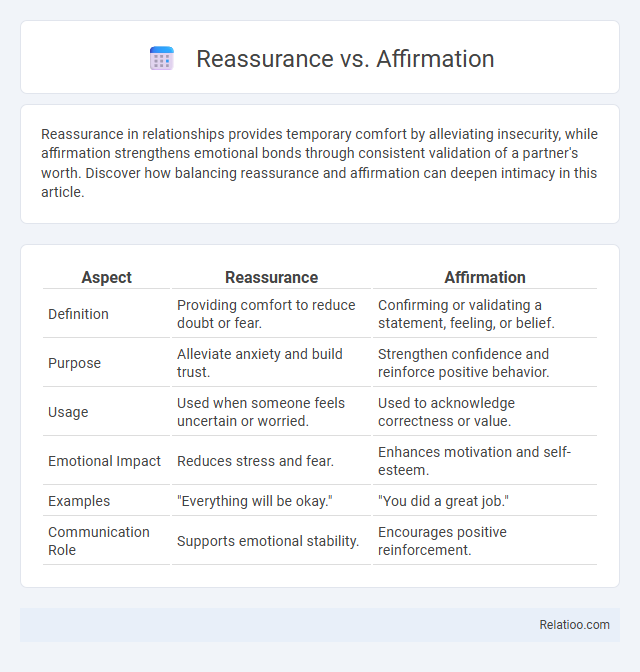Reassurance in relationships provides temporary comfort by alleviating insecurity, while affirmation strengthens emotional bonds through consistent validation of a partner's worth. Discover how balancing reassurance and affirmation can deepen intimacy in this article.
Table of Comparison
| Aspect | Reassurance | Affirmation |
|---|---|---|
| Definition | Providing comfort to reduce doubt or fear. | Confirming or validating a statement, feeling, or belief. |
| Purpose | Alleviate anxiety and build trust. | Strengthen confidence and reinforce positive behavior. |
| Usage | Used when someone feels uncertain or worried. | Used to acknowledge correctness or value. |
| Emotional Impact | Reduces stress and fear. | Enhances motivation and self-esteem. |
| Examples | "Everything will be okay." | "You did a great job." |
| Communication Role | Supports emotional stability. | Encourages positive reinforcement. |
Understanding Reassurance and Affirmation
Reassurance involves alleviating doubts or fears by providing comfort and confidence, while affirmation focuses on recognizing and validating your feelings, thoughts, or actions to reinforce self-worth. Understanding reassurance helps you respond empathetically during moments of uncertainty, whereas affirmation promotes sustained positive self-esteem by acknowledging inherent value. Both concepts play critical roles in emotional support, but reassurance primarily addresses immediate anxieties, and affirmation nurtures ongoing personal growth.
Key Differences Between Reassurance and Affirmation
Reassurance and affirmation serve distinct psychological functions; reassurance aims to alleviate doubt or anxiety by providing comfort and confirming safety, while affirmation strengthens confidence and self-worth by validating personal qualities or achievements. Unlike reassurance, which addresses fears or uncertainties, affirmation focuses on reinforcing positive beliefs and encouraging self-acceptance. Understanding these key differences is essential for effective communication in therapy, coaching, and interpersonal relationships.
Psychological Impact of Reassurance
Reassurance reduces anxiety by providing evidence-based feedback that calms fears and builds trust, which is crucial in therapeutic settings for emotional regulation. Unlike affirmation, which strengthens self-worth by validating personal qualities or actions, reassurance directly addresses uncertainty or doubt, offering comfort through clarity and support. The psychological impact of reassurance lies in its ability to temporarily alleviate distress, though excessive reliance may hinder independent coping mechanisms and increase anxiety over time.
The Role of Affirmation in Self-Esteem
Affirmation plays a crucial role in building and maintaining self-esteem by reinforcing positive beliefs about oneself, which helps counteract negative self-talk and doubt. Unlike reassurance, which seeks to calm fears through external validation, affirmation originates internally and encourages individuals to recognize their strengths and intrinsic worth. This internal acknowledgment fosters resilience and promotes a stable, enduring sense of self-worth essential for mental well-being.
When to Offer Reassurance
Offer reassurance when someone experiences anxiety, uncertainty, or self-doubt, providing a sense of safety and confidence through supportive communication. Affirmation is best used to validate personal qualities or achievements, boosting self-esteem and motivation without addressing fears directly. Reassurance strengthens emotional security by addressing worries with empathy and factual comfort, making it essential during moments of stress or fear.
When to Use Affirmations
Affirmations are most effective when reinforcing positive beliefs and boosting self-confidence during goal-setting or personal growth phases. Unlike reassurance, which aims to reduce anxiety or doubt in uncertain situations, affirmations focus on cultivating a positive mindset by consistently repeating empowering statements. Use affirmations daily to strengthen motivation, improve self-esteem, and maintain focus on desired outcomes.
Common Misconceptions About Reassurance and Affirmation
Common misconceptions about reassurance and affirmation include the belief that reassurance simply involves offering false comfort or that affirmation equates to uncritical praise. Reassurance is often misunderstood as dismissing concerns, whereas it actually provides evidence-based confidence to alleviate doubts. Affirmation validates feelings and strengths without necessarily solving problems, fostering self-esteem rather than dependency.
Reassurance in Relationships: Pros and Cons
Reassurance in relationships provides emotional security by addressing doubts and fears, helping to reduce anxiety and build trust between partners. Your consistent expressions of reassurance can strengthen the bond and foster open communication, but over-reliance may lead to dependency and undermine self-confidence. Balancing reassurance with affirmation cultivates a healthy dynamic, ensuring both partners feel valued and self-assured without becoming excessively reliant on external validation.
Building Confidence Through Affirmation Techniques
Building confidence through affirmation techniques involves consistently reinforcing positive beliefs and self-perceptions, which helps individuals internalize their strengths and abilities. Unlike reassurance, which temporarily alleviates doubt by addressing fears, affirmation actively cultivates a resilient mindset by embedding empowering statements into daily practice. This approach fosters lasting self-confidence by shaping neural pathways associated with self-efficacy and positive thinking.
Choosing Between Reassurance and Affirmation in Daily Life
Choosing between reassurance and affirmation in daily life depends on your need to either alleviate doubt or reinforce positive beliefs. Reassurance provides comfort by addressing concerns and reducing anxiety, while affirmation strengthens confidence by validating your worth and abilities. Understanding when to seek reassurance versus affirmation helps you maintain emotional balance and build self-trust effectively.

Infographic: Reassurance vs Affirmation
 relatioo.com
relatioo.com